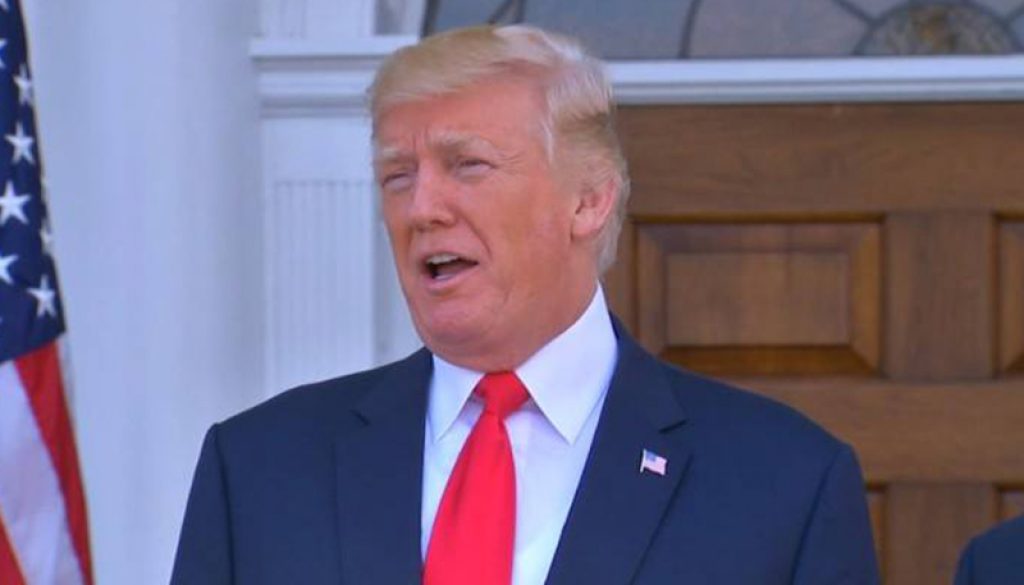Rich Jones Response to the Trump Announcement
President Trump said that the ongoing opioid epidemic — which is killing more than 100 people each day — is the “worst drug crisis in American history” and said his administration is declaring it a public health emergency, pledging the nation’s full resolve in overcoming it.
This is my thoughtful response to the Trump announcement.
First, the public proclamation of a “public health crisis” and the associated attention on the DISEASE of addiction is a positive step in and of itself. That cannot be denied. Given the terrible history of stigma and embarrassment and shame associated with the disease it is miracle we are talking openly about this issue.
The President of the United States talking about it as a public health issue is a major breakthrough. Furthermore, much gratitude for the hard work and commitment of the organized recovery advocacy movement.
I don’t mean the treatment center marketers who call themselves “advocates”. I mean organizations such as Facing Addiction, Faces and Voices of Recovery and the grassroots Recovery Community Organizations (RCO) out there. Good work. People listened.
Second, we have no idea “exactly” what Presidents Trumps means with his announcement. Questions still need to be answered, such as:
- How will the money roll out?
- Will the money even show up?
- What initiatives will be funded?
However, we can gain insight and make predictions based on what was discussed…
Third. I am disheartened because there is no acknowledgement or honest discussion regarding the core issue associated with the crisis…
Medically Assisted Treatment (M.A.T.) was suggested as the cure all. More detox beds also discussed. (Do you know only about 20% of people in South Carolina-and probably nationwide-do anything “post detox”?)
These 2 “solutions” are not comprehensive solutions as they fail to recognize or address the fact that only about 3% of the 90% of the “untreated” people actually want help. Do you get that?
There is a treatment gap that exists due to “willingness” not due to access.
I’m sure increasing access will cut into the 90% untreated somewhat— but not at any significant level. YOU ARE PROVIDING SOLUTIONS FOR COMPLETELY DISENGAGED PEOPLE, assuming that they will all sudden show up.
The proposed solutions assume these folks will also magically follow the treatment plan as dictated by the provider.
“DO YOU SERIOUSLY THINK THAT IS HOW THIS WILL GO DOWN?”
Fourth. Recommending “access” as the answer to the Opioid Epidemic demonstrates a fundamental misunderstanding of the reality of addiction. This is not surprising given the fact that all of our models and all of our research and all of our “traditional” ideas about addiction are founded on the experience of WORKING WITH WILLING PEOPLE.
BECAUSE UNWILLING PEOPLE ARE IGNORED UNTIL THEY BECOME WILLING!!!!
And fifth, my last point.
The answer to our nation’s problem, President Trump, is that what we need is a massive amount of money and support for community based outreach programs and assertive recovery coaching/peer based support services.
Re-allocation of insurance money from “intensive outpatient programs” that are office based and last 8 weeks to community/home based outreach coaching that last 12 month or 18 months. The cost would be essentially the same. It can be done.
WE NEED THOUSANDS OF RECOVERY COACHES OPERATING
IN INDEPENDENT RECOVERY ORGANIZATIONS.
They need to be accountable to independent RCO’s and operate in collaboration with the existing treatment system but NOT under the jurisdiction of the existing infrastructure. The money should come directly to the organization and not funnel through another entity.
Commercial Insurance should contract with the RCO’s for bundled services. The RCO’s should be held accountable and be reimbursed based on engagement rates and retention in recovery rates — not based on “successful completion of a program”.
I will speak for my organization–we will pay the money back if we suck. if we don’t deliver.
NOW THAT is a novel idea isn’t it… Until we think innovation and “new” solutions we are throwing money out the window…
This is all self-evident. It’s all very logical. Someone please forward this to President Trump…





October 31, 2017 @ 3:54 am
Spot on! A huge challenge is effectively reaching the 90% that do not want help.
But why aren’t we talking more about prevention? How about “Mental Health Programs” that are part of every school’s curriculum, designed to redirect kids before they reach for a drug?
I think that an entire shift in our cultural structure is necessary. Sounds a little scary, right? But what we hear in EVERY addiction case is “I wanted to feel better” OR “Not feel at all”. That sentiment crosses every race, religion and every socioeconomic barrier.
I have a good friend who just lost her son to an overdose. Here’s is a family that is loving, close knit and by “ordinary measures” well balanced. And yet, their son struggled with addition. So, I think that it’s those ordinary measures that we need to look at. Particularly, how we teach our children to get along in life.
If we want to have an honest discussion regarding the core issue associated with the crisis we have to acknowledge the core issue – mental health. And an all-out, nation-wide raw discussion that may involve uncomfortable topics is essential. What has been coined as “New Age Spirituality” by those that fear any suggestions outside of their religious constraints – such as “the art of living in the now” and “thought awareness” – are clearly a step in the right direction.
We ‘re not equipping our children with effective actions that they can implement when their “thinking” creates “emotions” that they “DO NOT want to feel”. Let’s talk about that too. Any discussion that does not include addressing an individuals “thinking” is missing the mark.
November 1, 2017 @ 7:14 pm
For years we’ve been told that only evidence-based prevention produces outcomes and should be the only programs funded by taxpayer dollars.
Well the evidence is in …these outdated programs are not working. Innovative grassroots programs are being shut out because they can’t get connected with University researchers that want a bundle of money. There’s an undercurrent of Grassroots efforts gaining momentum and galvanizing for prevention. Reality Tour is a model that communities can do on their own. You just need 12 people who care that our kids are dying. (Reality Tour.org) Educating parent and child together to form a family bond for prevention shouldn’t be a novel idea… It’s just common sense. ‘My New Leaf’ recovery app, available for Android and iPhones, was developed for those in recovery by a college student and uses AI. Sage’s Army is connecting people to recovery resources and filing a need that our state government won’t. These are all Grassroots efforts reaching thousands of people in PA and beyond. There should be opportunities to recognize new ideas new ways of addressing the problem and see that these ideas are shared with the public at large and the country.